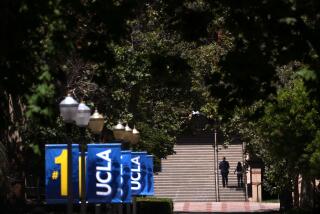UCLA prof raised alarm over suspect
A UCLA professor who taught the student accused of slashing a female classmate’s throat last week said Saturday that he told a university administrator 10 months ago that he had concerns about the student’s mental health, but strict federal privacy laws prevent UCLA officials from disclosing how they handled the issue.
Stephen Frank, an associate professor in the university’s history department, met the suspect, undergraduate student Damon Thompson, when he enrolled in the instructor’s Western civilization class late last year, Frank said in an interview.
Frank said he grew concerned about Thompson in mid-December 2008, after the student sent several e-mails complaining that classmates sitting around him had been disruptive and made offensive comments to him while he was taking a written exam.
In one of the e-mails that Frank provided to The Times, Thompson, 20, also accused Frank of taunting him.
“I believe I heard you, Professor Frank, say that I was ‘troubled’ and ‘crazy’ among other things,” Thompson wrote in the e-mail. “My outrage at this situation coupled with the pressure of the very weighted examination dulled my concentration and detracted from my performance.”
Frank, who was present during the entire exam, said that Thompson sat in the front row during the test and that he saw nothing to support Thompson’s complaints. In addition, Frank said he asked several teaching assistants in attendance about the complaints. The assistants told him they saw nothing unusual, Frank said.
“I didn’t say anything to you or the other faculty members after the examination because I was dazed over the entire situation as you may have noted from my demeanor,” Thompson wrote in the e-mail.
Soon after the exam, Frank said, an official from the dean of students’ office telephoned him to discuss a complaint by Thompson concerning the final exam. The official told Frank that he had met with Thompson several times to discuss the issue.
Frank said he was told that other professors had reported similar exchanges with Thompson, who complained he was the constant target of taunts from students across campus -- in dorms, dining areas and the library.
To Frank, the e-mails he received from Thompson indicated the student was in need of serious help. Frank said he urged university officials to take action. An official told Frank that they could only suggest to Thompson that he seek treatment, but they could not require him to seek psychological services.
“My concern was in the context of other violent incidents on campuses around the country,” Frank said, explaining why he discussed the issue early on with university officials and why he chose to speak publicly about it Saturday.
University officials have acknowledged that “Thompson was known to our student affairs office prior to the incident,” but could not disclose information about the suspect, citing privacy laws.
UCLA spokeswoman Carol Stogsdill said Saturday that she and other university officials were forbidden by law from discussing any specifics about how the university may have reacted to any complaints about Thompson’s behavior or any possible interactions he might have had with psychological counselors on campus.
Stogsdill noted that campus police have said they have no record of any formal complaints being made about Thompson prior to his arrest.
Frank said he has turned over the e-mails he received from Thompson to law enforcement investigators.
Thompson, who is from Belize and was in his final year as an undergraduate student, is accused of slashing the throat of a female classmate during a chemistry class. He is being held on $1-million bail on suspicion of attempted murder and is expected to be arraigned Tuesday. Investigators so far have discovered no motivation for the attack on the 20-year-old woman, whose condition is improving, according to family members.
--
Times staff writer Joel Rubin contributed to this report.
More to Read
Sign up for Essential California
The most important California stories and recommendations in your inbox every morning.
You may occasionally receive promotional content from the Los Angeles Times.











